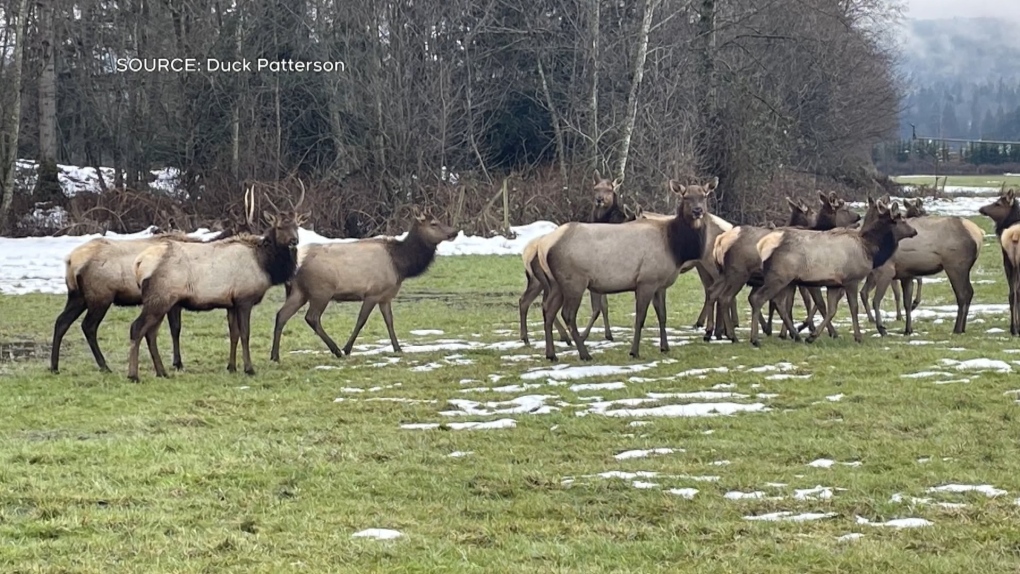Vancouver Island farmers struggle to deal with threatened elk species
 (Duck Patterson)
(Duck Patterson)
Farmers in the Cowichan Valley are losing crops and dealing with property and field damage caused by Roosevelt Elk, which have become a regular fixture on some farms in the area.
The threatened species typically moves to lower elevations during the winter months searching for more plentiful food, but in the last few years, in the Duncan area, some herds have been staying year-round on farmland.
In North Oyster, where Howie Davis has farmed cattle for more than 50 years, a herd of 12 elk showed up in December four years ago. Fortunately for him, they've so far always left by February or March.
"The herds are expanding every year," said Davis.
In the few months the elk are on the farm, Davis said they cause a lot of damage, knocking down fences, tearing the hay fields up with their hooves and eating whatever hay is growing over the winter "right down to nothing."
The elk damage to the hay fields has reduced the number of harvests from four to three in a season, said Davis.
"That’s one crop you don’t get to sell, less income," he said. "[The provincial government has] been compensating me for that … not to what it costs."
A University of Alberta research project intended to reduce human-elk conflict in the Cowichan Valley started in August 2021.
The team has set up multiple trail cameras in the valley to gather data on the herds' numbers and movements.
"To implement any sort of management strategies we need to have a good understanding of what’s happening with the population, how many are there, where are they on the landscape and how are they interacting with human infrastructure?" said Kate Rutherford, a masters student at the University of Alberta.
Rutherford says the provincial government has put a lot of effort into increasing the elk herds in the Cowichan Valley to create a healthy, sustainable population, which seems to have paid off.
"Everyone wants the population to be at healthy levels," she said.
"There’s also that balance, right, with maintaining a healthy population size but also minimizing the occurrence of human-elk conflict, which is going to increase as urbanization increases," she added.
Researchers are also planning to test deterrents to keep elk out of farms.
"We plan to broadcast predator vocalization on the perimeter of these fields where we’re currently monitoring elk using camera traps, and they will be broadcasted when triggered by animal movement," said Rutherford.
The team is also asking landowners in the area to contribute to their research by reporting elk sightings to them either through the iNaturalist app or by emailing the team directly at rooselk@ualberta.ca
The researchers hope to share their work with farmers and the provincial government as way to help with the management of Roosevelt Elk.
CTVNews.ca Top Stories

BREAKING Ontario Provincial Police arrest 64 suspects in child sexual exploitation investigation
Ontario Provincial Police say 64 suspects are facing a combined 348 charges in connection with a series of child sexual exploitation investigations that spanned the province.
AstraZeneca says it will withdraw COVID-19 vaccine globally as demand dips
AstraZeneca said on Tuesday it had initiated the worldwide withdrawal of its COVID-19 vaccine due to a 'surplus of available updated vaccines' since the pandemic.
Toronto police seek suspect vehicle after security guard shot outside Drake's mansion
Toronto police are seeking help from the public as they continue to investigate a shooting that seriously injured a security guard outside rapper Drake's mansion.
World's record-breaking hot temperature streak stretches through April
The world just experienced its hottest April on record, extending an 11-month streak in which every month set a temperature record, the European Union's climate change monitoring service said on Wednesday.
Most of Canada to receive emergency alert test today
The federal government will test its capacity to issue emergency alerts today, with the exception of Ontario, where the test will take place on May 15.
OPINION What King Charles' schedule being too 'full' to accommodate son suggests
Prince Harry, the Duke of Sussex, has made headlines with his recent arrival in the U.K., this time to celebrate all things Invictus. But upon the prince landing in the U.K., we have already had confirmation that King Charles III won't have time to see his youngest son during his brief visit.
Seafood, eat food: Calgary Stampede releases Midway menu
The Calgary Stampede has released its menu of sweet, salty and spicy treats available on the Midway for the Greatest Outdoor Show on Earth.
Boy Scouts of America is rebranding. Here's why they've changed their name
After more than a century, Boy Scouts of America is rebranding as Scouting America, another major shakeup for an organization that once proudly resisted change.
Ontario man devastated to learn $150,000 line of credit isn't insured after wife dies
An Ontario man found out that a line of credit he thought was insured actually isn't after his wife of 50 years died.






























